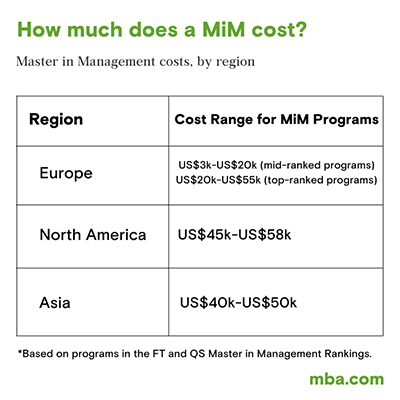Undergrad's Guide to Finding Your Best Fit Business Master's Program
Graduate business school pre-experience business master's programs are offered in a huge variety of specializations. Our guide helps you find your best fit.


If you’ve just completed your undergraduate degree, you’re probably deciding on your next career move.
If you’re looking for an introduction to the fundamentals of business, alongside global exposure and work experience, a Master in Management (MiM) may be right for you.
Here, we break down everything you need to know about Master in Management degrees, including who they are for, what you can expect from the MiM curriculum, your MiM jobs and salary prospects, and how you can apply.
Master in Management programs are popular among new graduates and early career professionals looking to step into business and management-focused roles.
Around 85 percent of MiM applicants are under 24, according to the Graduate Management Admission Council’s (GMAC) mba.com Prospective Students Survey.
Average work experience for candidates is 1.5 years. These candidates rank international study and work opportunities, as well as a chance to gain managerial skills, as their top priorities for studying a MiM, according to GMAC.
There’s a fairly even gender split, on the whole: around 56 percent of MiM applicants are male, while 44 percent are female.
In terms of academic background, 64 percent have a business related degree, 29 percent come from a STEM degree, while 12 percent did a humanities or social sciences degree.
How long is a master’s degree? MiM programs come in various lengths and formats.
One-year Masters in Management
The majority of Master in Management degrees are one-year, in-person programs. These are ideal for candidates who are either keen to boost their employment prospects, or who already have some prior work experience, as you graduate faster and apply more quickly what you have learned.
“A graduate from a one-year program will be able to seek opportunities faster and benefit from the knowledge gained from their studies,” says Christos Tsinopoulos, director of management programs at Durham University Business School.
Two-year Masters in Management
Two-year Master in Management programs are popular among candidates looking to dive deep into specialist subjects and gain more international exposure or work experience.
Business schools in France—like HEC Paris and ESSEC Business School—offer Grande Ecole programs, where you complete the core MiM curriculum in your first year and specialize in a certain area, gain a specialized master’s degree, and get work experience via an internship in your second year.
Graduate business school pre-experience business master's programs are offered in a huge variety of specializations. Our guide helps you find your best fit.
There’s also the option to take an optional gap year in between your first and second years to gain 12 months of work experience, extending your MiM experience to three years.
Online Masters in Management
An Online Master in Management is a great opportunity for students looking for more flexibility and accessibility to top programs. The online format is well-suited to MiM candidates who want to work, earn a salary, and study at the same time.
Aston Business School’s MSc in Management is available in both online and in-person formats. The online MiM is twice the length (two years rather than one), as it takes place part-time.
Specialized Masters in Management
Some MiM programs come with an in-built specialization focusing on a specific function or industry. Take the Master in Management of Disruption at Esade Business School, a program specifically designed for STEM graduates, helping them lead disruption in companies using technology.
Other specialized Masters in Management include:
Master in Management programs are designed to give you a definitive introduction to business, as well as to build your confidence as a leader or manager. Here’s what you can expect from a Master in Management:
Business fundamentals
Given that many students come from non-business backgrounds, MiM programs will give you a rigorous introduction to topics that you’re likely to come across in the business world. These include accounting, finance, marketing, data analytics, and strategy.
Leadership skills
With many MiM destined for leadership positions, your MiM is the perfect chance to learn and practice skills you need to lead and thrive in the workplace. These include ‘soft’ skills such as communication, motivation, teamwork, feedback, coaching, and negotiation. These are often taught through practical methods, such as group projects or simulations.
Specialist subjects
While Masters in Management are generalist degrees, there are opportunities to dive deeper into certain subject areas through elective courses. Popular topics include machine learning, artificial intelligence, entrepreneurship, and corporate social responsibility. You may even have a chance to combine your MiM with a specialized master’s.
For MiM graduate Satyam Goel, one of the best things about studying a Master in Management at ESMT Berlin was being able to choose elective courses to tailor the program to his career goals. “Given that the market opportunities were good for AI, machine learning, and that sort of thing, I thought it was a logical choice to make,” he says.
International trips
Masters in Management programs typically include international exchanges, consulting projects, and field trips—some programs may even be spread across multiple campuses on different continents.
Leonardo Deschaseaux enrolled on EMLYON Business School’s European Triple Degree Master in Management, where students study on three campuses in France, the UK, and Germany. “You get different perspectives, from different professors, from the three different universities,” he says.
Work experience
For early career professionals, a critical element of any MiM degree is the opportunity to build work experience. This may take place through a short internship or a year-long placement.
Marco Trada, a graduate from EDHEC Business School’s dual degree MiM, says his work experience year hugely benefited his future prospects as a consultant. “You can apply the skills you learn during your master’s, and understand whether the industry you are interested in joining will be the right fit for your career,” he says.
The cost of a Master in Management varies depending on where you choose to study.
For lower-to-middle-ranked European MiM programs, you can expect to pay less than US$20k. Tuition is especially affordable if you’re an EU student staying within the EU; often a fraction of the price that international students pay.
Tuition fees are more expensive for top-ranked Master in Management programs. At schools like EDHEC and ESSEC, international students pay over US$50k for two-to-three year programs.
MiM programs in the United States are more expensive. The 10-month MiM program at Duke University’s Fuqua School of Business costs just under US$58k.

So, what can you do with a Master in Management?
Pursuing a Master in Management keeps your career options open and makes you attractive to employers. Fifty-four percent of companies plan to hire MiM graduates in 2021, according to the GMAC Corporate Recruiters Survey.
There are many exciting jobs for Master in Management graduates across a range of industries, mostly at associate or analyst level. Examples of roles MiM students land after graduation include:
Many big-name companies recruit MiM graduates, including:
Given the cost of Master in Management programs, typically incurred off the back of undergraduate program tuition, you may be wondering if a MiM is worth it.
The salary you can expect to earn after you complete the program is one sign that an MiM is worth the cost. The average MiM graduate earns a starting salary of US$75,000, according to GMAC. There are opportunities to maximize this even further, depending on where you choose to work and which school you graduate from.
Master in Management graduates from IIM Ahmedabad in India earn US$140k on average three years after they graduate according to the Financial Times. At the University of St.Gallen, MiM graduates earn US$113k within three years.
The return on investment you get from a Master in Management is strong given the top industries and employers you can go on to work for. Much like other business degrees, consulting, finance, and technology are the most popular career destinations.
Chris Li, a CUHK Business School graduate, says his MiM helped him land a role in consulting. “Consultants need to think clearly and critically to solve problems effectively,” he says. “What benefited me most [from my MiM] was the critical thinking training, which in turn led to great improvement in my problem-solving and decision-making abilities.”
Olga Kotenko, a demand and supply planner, says her MiM from the University of St.Gallen (known as the SIM) prepared her a new job at Apple. “Apple culture is quite similar to SIM culture. People constantly look for improvements and challenge the way things are,” she says.
Typical Master in Management admission requirements include:
Your Master in Management application consists of several stages. You start with a written application, which consists of a number of essay questions to help the school understand your motivations behind pursuing an MiM, as well as your fit for their program specifically.
Alongside your written application, you need to submit references, academic transcripts, and resume.
Use our business school application checklist and timeline to nail the admissions process and access useful mba.com resources right when you need them.
You’ll likely need to submit a GMAT or standardized test score. Some schools state that candidates should meet a certain minimum GMAT score (600+ at certain top schools), while others stress that lower scores can be offset by other parts of your application.
Shortlisted candidates are invited to interview. This is your opportunity to build on your written application: demonstrate your fit for the school, what is different about you, and what you’ll bring to the program.
Now you know more about Master in Management degrees, it’s time to consider your options.
Download our Graduate Business School Application Guide for Undergrads and learn more about the difference between an MiM and an MBA, or take our quiz to find out whether an MiM or a specialized master’s is best for you.
